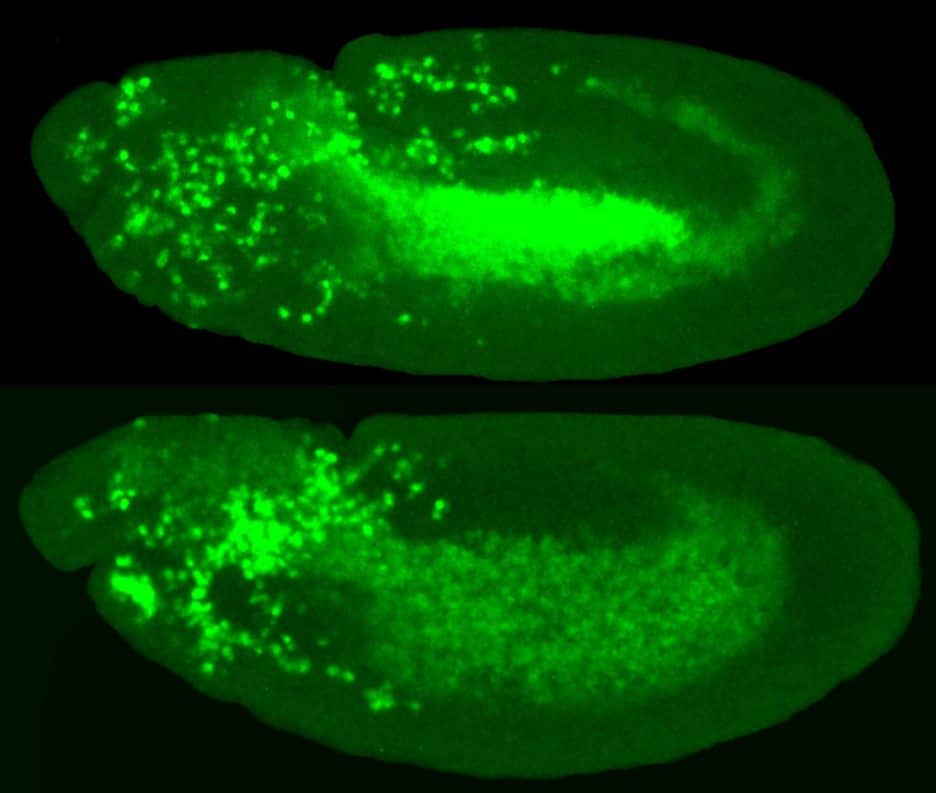It is difficult to predict when immune cells may attempt to infiltrate a tumor.
For scientists like Professor Daria Siekhaus and her team to be able to research this cell invasion process in-depth, they need something more trustworthy and that’s why they turn to fruit fly embryos.
Macrophages, the fruit fly’s most common type of immune cell, go from where they are born to where they are needed by invading tissue during the embryo’s development. These tiny translucent animals do so at a specific time period, allowing scientists to monitor the process that takes place within them.
Thanks to the Bioimaging Facility at IST Austria that they can see the macrophages, highlighted with a green fluorescent protein, move into the tissue.

Creating an armor
It is currently unclear what cellular modifications are required for this to occur, as well as which genes are responsible for these changes. The Siekhaus group, led by first authors Vera Belyaeva, Stephanie Wachner, and Attila Gyoergy, has thrown fresh light on this mechanism, which is vital in both health and sickness.
“Previously, we found that a specific gene, called Dfos, is enriched in the immune cells and we wondered what it did,” says Siekhaus.
“Now we can prove that it triggers the assembly of actin filaments.”
These protein threads are concentrated on the inside of the cell membrane, commonly known as the cell cortex, and are responsible for maintaining the stability of the cell surface. The authors demonstrate that actin filaments get denser and more attached to one another as a result of a complex cascade involving various proteins, resulting in the formation of a stable shell.
“We hypothesize that this works like a tank, deforming surrounding cells while protecting the immune cell’s nucleus from mechanical pressure as it invades the tissue,” Siekhaus explains.
Furthermore, the researchers were able to demonstrate in vivo that the absence of this actin shell makes it more difficult for immune cells to enter the surrounding tissue unless the surrounding tissue is made softer.
Strengthening immune cells to fight cancer
Although a fruit fly and vertebrates such as mice and humans appear to have little in common on the surface, their genes act in remarkably similar ways. The researchers at IST Austria, in collaboration with Professor Maria Sibilia of the Medical University of Vienna, discovered evidence that the vertebrate gene Fos, which is the equivalent of the fruit fly gene Dfos, activates the same genetic pathways as the fruit fly gene Dfos.
“We think that the same mechanism we found in the fruit fly also plays a role in vertebrates,” says biologist Daria Siekhaus.
This increases the possibility that the results of the study will aid in the identification of novel cancer therapeutic targets. Scientists working in the field of immuno-oncology are looking for ways to engage the body’s immune system so that it can attack a tumor. One of the difficulties they must overcome is the inability of the immune cells to enter the tumor.
“If one could strengthen their protective shell, it could make it easier for them to invade the tumor tissue,” Siekhaus concludes.
Source: 10.1371/journal.pbio.3001494
Image Credit: Getty
You were reading: Study finds a new mechanism that helps immune cells to invade tissues
